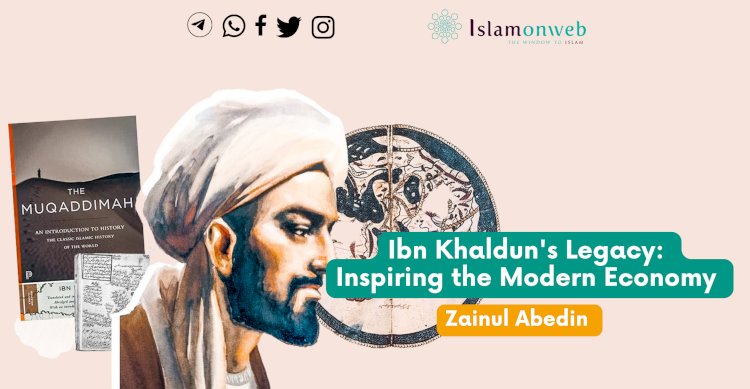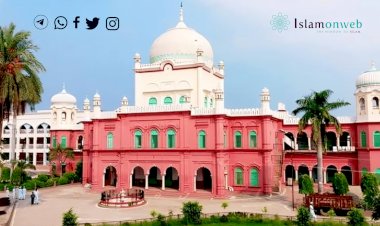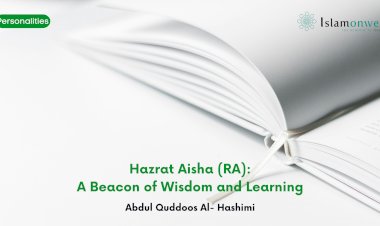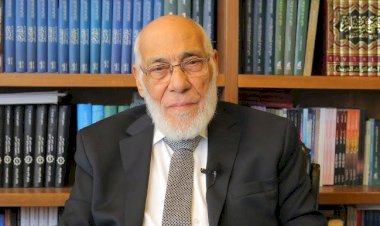Ibn Khaldun's Legacy: Inspiring the Modern Economy
Ibn Khaldun, a highly respected Muslim economist, is celebrated in the Western world for being a pioneer of contemporary economic ideas and financial philosophies. He used historical insights and sociological perspectives to understand a nation's economy, which sets him apart from earlier thinkers who tended to rely solely on traditional approaches.
Ibn Khaldun's recognition of the economical hypothesis and monetary modus is incredibly exceptional. The canon of values, the apportionment of labours, the price orderliness, the commandment of provision and exigence, consumption and manufacture, coinage and cashes, principal formation, assets investment, inhabitants amplification, macroeconomics of taxes and civic expenditure, commerce sequences, agriculture and husbandry, industry and marketing, property rights and prosperity privileges, and further weighty focal aspects are all exhaustively elucidated in the case study of Muhammad Nejatullah Siddiqi on Ibn Khaldun's pecuniary deliberation in 1976.[i]
Case Study of Nejatullah Siddiqi in 1976
In a study conducted by Nejatullah Siddiqi in 1976, it was elucidated that Ibn Khaldun provided insights into various critical junctures that societies go through, and how their economies evolve in the process. He emphasized that the concept of a dynamic labor supply is the cornerstone of these ideas. He stated: "Ibn Khaldun's relevance endures today as a source of inspiration for the advancement of the modern economy."
To bridge these concepts, we can appreciate how Ibn Khaldun's wisdom extends through the ages, influencing modern economic thinking. His emphasis on the ever-changing nature of labor supply and its impact on economic growth continues to be a valuable source of guidance for contemporary economic development.
Survey by Jean David C. Boulakia in 1971
Ibn Khaldun, long before his 'official' recognition in European economic thought, had already laid the foundation for crucial economic models, as highlighted in Jean David C. Boulakia's 1971 study. Preceding the likes of Adam Smith or David Ricardo, he underscored the significance and necessity of dissecting labor, understanding its value, and establishing a framework for its rates. Moreover, prior to the ideas of Thomas Malthus, Ibn Khaldun had revolutionized population philosophy, offering fresh perspectives on demographic patterns and their implications on economic dynamics. His pioneering work in this area anticipated Malthus's later contributions.
Furthermore, preceding the theories of John Maynard Keynes, Ibn Khaldun had already stressed the role of the state in shaping the economy. His insights into the weightage of government intervention and its impact on economic stability were quite ahead of his time. Ibn Khaldun's remarkable contributions thus not only predate many Western economic thinkers but also provide a valuable historical context for understanding the evolution of economic thought. His ideas continue to resonate as an enduring source of wisdom for contemporary economic analysis and policy-making.
Analysis of M. Umer Chapra in 1999
A more in-depth exploration of Ibn Khaldun's economic philosophies can be found in M. Umer Chapra's 1999 analysis,[ii] which argues that Ibn Khaldun's ideas offer a dynamic, comprehensive, and multifaceted depiction of the ascent and decline of societies. These insights form the foundation of Islamic economic thought, emphasizing the utmost importance of achieving socio-economic integrity and public welfare.
Chapra's analysis underscores the enduring relevance of Ibn Khaldun's contributions to Islamic economics. It shows how Ibn Khaldun's understanding of the interconnectedness of economic, social, and political factors provides a holistic framework for addressing contemporary economic challenges within an Islamic context. In a world where economic theories and practices are continually evolving, Ibn Khaldun's emphasis on the broader societal context and the well-being of the public remains a vital source of inspiration for modern Islamic economics and the pursuit of economic justice and social equity.
Moreover, Ibn Khaldun built a fathomable dynamic arrangement and plausible fluctuating coordination using these philosophies, where economic forces channeled economic undertakings toward long-term discrepancies. M. Umer Chapra's research in 2008 benevolences the theory of transdisciplinary and mutable fruition.[iii] Accordingly, figures of ethical, societal, commercial, political, and chronological influences interrelate through time to regulate whether an economy or society would propagate or degenerate. One of these factors obliges as a trigger mechanism, and if another rejoinder is paralleled in the equivalent direction, amelioration or deterioration sprint through a cascade of dealings until it would instigate problematic disorder to tell what triggered what.
Scrutiny of Nurul Huda & Hendra Pertaminawati in 2016
Nurul Huda, a researcher of finance and economics in 2016 endeavoured to comprehend the philosophical groundwork of Ibn Khaldun's economic interpretations in order to investigate his designs.[iv] According to the verdicts of this study, Ibn Khaldun's fiscal vantage point is underpinned by two approaches:
First: An instantaneous glance of sociological performance, specifically how Ibn Khaldun observed and scanned voluminous contemporary economic procedures in a society.
Second: A hasty glimpse of legal strategy, exhausting legal documentations to regulate economic activities to formulate it function appropriately.
There are superfluous fundamentals that buoyed economic goings-on in supplementary to these two strategies, conspicuously freedom and justice.
Adding more on this, Hendra Pertaminawati in 2016 offered an altered study that inspected the market mechanism and pricing in Islamic finances as proposed by Ibn Khaldun.[v] Market Mechanisms, often known as Pricing, are the ordinary propensities of the free market to uphold market expenses in equilibrium, accumulating stream and mandate, often called Supply and Demand to equivalent echelons. There is no compression on the price to amend yet again at this time since there is neither an indulgent superfluity of demand nor an accumulated overabundance. Although stream and mandate are not always in equilibrium and some markets may bear elongated stint to reach equilibrium when circumstances rehabilitate promptly, the broad-spectrum tendency is that the market eventually fetches equilibrium.
Inspections of Abu Bakar Jaafar & Abdul Ghafar Ismail in 2017
Ibn Khaldun, as an economist, demonstrated a unique focus on various socio-religious perspectives. He endeavored to elucidate how his economic theories could not only lead society to material prosperity and opulence but also contribute to the enhancement of religious values, thereby fostering harmonious and straightforward interactions within the community. This multifaceted approach to economics is further emphasized in a study by Abu Bakar Jaafar and Abdul Ghafar Ismail in 2017.[vi] Their research revealed that Ibn Khaldun's analysis of tax rates can be harnessed to determine the ideal balance in taxation.
Ibn Khaldun's perspective on socio-religious factors within economic thought is especially notable. By integrating economic principles with the promotion of religious values, he envisioned a society where economic prosperity and moral integrity coexisted harmoniously. This approach not only provides a comprehensive view of economic development but also highlights the interconnectedness of economic and societal well-being. Incorporating Jaafar and Ismail's insights, we see that Ibn Khaldun's contributions extend to practical aspects of taxation and public finance, demonstrating his enduring relevance in modern discussions of economic policy. His analysis of tax rates can serve as a valuable reference for policymakers striving to strike a balance between fiscal sustainability and the welfare of the populace.
Examination by Dimas Dwi Setiawan in 2018
According to economists, slashing tax rates is imperative in intensification of tax revenues. Ibn Khaldun had a conception of free trade that is still decriminalized today, according to a study by Dimas Dwi Setiawan 2018.[vii] Stream and mandate, market equilibrium, and manufacture and circulation are all encompassed in the notion. there are three fashions in which Ibn Khaldun's designs can be pragmatic and hardheaded to Indonesia's international trade:
First: The rise in the financial intricacy catalogue for Indonesia.
Second: Increase the quantity of experienced and trained personnel.
Third: Generate a science-centered economy.
Conclusion
In condensing the extensive panorama of Ibn Khaldun's economic theories, it is evident that his insights, while striking and profound, must be considered within the context of their applicability in modern times. Over the centuries, the world has evolved, and the demands of societies have shifted, altering the trajectory of economic development. Ibn Khaldun's ideas, as illuminated through the research highlighted here, continue to stand as testaments to the depth and timelessness of his economic philosophies. They offer a comprehensive understanding of economic and financial principles, providing valuable guidance for contemporary economies.
Furthermore, Ibn Khaldun's holistic approach, emphasizing the interconnectedness of economic, social, and political factors, remains relevant. His focus on achieving socio-economic integrity and public welfare presents a model that endures as a source of inspiration in modern Islamic economics. As economic theories and practices continue to evolve, Ibn Khaldun's emphasis on the broader societal context and the well-being of the public remains vital. His ideas resonate as enduring sources of wisdom for the pursuit of economic justice, social equity, and the advancement of modern economies. Ultimately, the journey through these studies allows us to appreciate Ibn Khaldun's enduring legacy and the remarkable insights he provided into the intricate web of economic, social, and political dynamics, offering a path toward magnificence and prosperity for nations and societies.
Endnotes
[i] Shiddiky, M.N. (1976). Studies in Islamic economics: Muslim economic thinking, a survey of contemporary literature. Jeddah: International Centre for Research in Islamic Economics King Abdul Aziz and the Islamic Foundation.
[ii] Chapra, M.U. (1999, October). Islam and economic development: a discussion within the framework of Ibnu Khaldun’s philosophy of history. In Proceedings of the Second Harvard University Forum on Islamic Finance: Islamic Finance into the 21st Century Cambridge, Massachusetts, Center for Middle Eastern Studies, Harvard University (pp. 23-30), p. 1
[iii] Chapra, M.U. (2008). Ibnu Khaldun's theory of development: Does it help explain the low performance of the present-day Muslim world? The Journal of Socio-Economics, 37(2), 836-863, p. 1.
[iv] Huda, N. (2016, May). Epistemologi pemikiran ekonomi Ibnu Khaldun. Proceeding of International Conference On Islamic Epistemology, Universitas Muhammadiyah Surakarta, p. 211
[v] Pertaminawati, H. (2016). Analisis pemikiran Ibnu Khaldun tentang mekanisme pasar dan penetapan harga dalam perekonomian Islam. Jurnal Koordinat, 15(2), 195-216, p. 195.
[vi] Jaafar, A.B., & Ismail, A.G. (2017). Tax rate and its determinants: An opinion from Ibn Khaldun. International Journal of Academic Research in Business and Social Sciences, 7(4), 881-899, p.1.
[vii] Setiawan, D.D. (2018). Pemikiran perdagangan bebas Ibnu Khaldun dalam kitab muqaddimah. Skripsi Sarjana Ilmu Ekonomi Islam.Universitas Islam Negeri Sunan Kalijaga, Yogyakarta.
About the author
Zainul Abedin is a second year student of the Department of Civilizational Studies at Darul Huda Islamic University, Kerala, India. His areas of interest include fiction, non-fiction, academic, content-writing, research papers, stories, poems, and articles.
Disclaimer
The views expressed in this article are the author’s own and do not necessarily mirror Islamonweb’s editorial stance.
























Leave A Comment